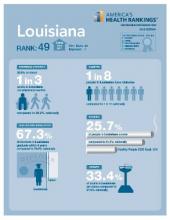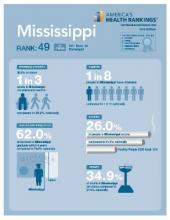Some of the least healthy states in our union are on the list of states that are not likely to take full advantage of federal money under the Affordable Care Act.
It begs the question: Do the states think they can do a better or quicker job of improving their residents’ health? And, will physicians want to practice in these states, some of which have seen no improvement in their health status in years?
Take Louisiana and Mississippi, for starters. They are perennially at the rock bottom when assessed on a variety of measures of health and literacy. The latest edition of the United Health Foundation’s report, America's Health Rankings, finds the two tied for 49th among the 50 states. According to the foundation, Louisiana and Mississippi have been in the bottom three since the 1990 edition of its report.
Obesity and diabetes in Louisiana rose through 2010, with a slight dip in 2011. Still, 33% of the state’s residents are obese. Although public health funding has increased over the past 5 years, the state is near or at the bottom for infectious diseases, preventable hospitalizations, violent crime, low birth weight, infant mortality, cancer deaths, and mental illness. The state is ranked 24th for the number of primary care physicians. One in five Louisianans were uninsured in 2011, up a bit from 17% in 2010. Gov. Bobby Jindal, recently sworn in as chairman of the Republican Governors Association, has said publicly that Louisiana will not expand Medicaid to 133% of the federal poverty level, as allowed under the ACA.
Next door, Mississippi is plagued with a high prevalence of sedentary lifestyle, obesity, diabetes, infant mortality, smoking, and cardiovascular death, according the foundation report. The state is ranked 48th in terms of the number of primary care physicians. Gov. Phil Bryant (R) has said his state will create its own health exchange, but will not opt for the Medicaid expansion.
Texas Gov. Rick Perry (R) has also said his state will not expand Medicaid or set up a health insurance exchange. His state has the highest percentage of uninsured residents in America at 24%. Texas ranks in the bottom quartile for obesity, cardiovascular deaths, infectious disease, child poverty, preventable hospitalizations, and a number of other measures. Texas is ranked 43rd for the number of primary care physicians.
Florida Gov. Rick Scott (R) initially said his state would reject both Medicaid and a health insurance exchange, but his final decision is not clear. Like Texas and Louisiana, Florida has struggled to insure its residents. Some 20% lack insurance now, and the number of children in poverty is on the rise. Immunization rates have dropped. The state is ranked 34th among the 50 for its health status and at 31st in number of primary care physicians.
Will physician populations expand in these states, if the states don’t accept the federal money provided by the ACA? Why practice in a challenging environment at a lower rate of pay than on offer in other states?
- Alicia Ault (on Twitter @aliciaault)


